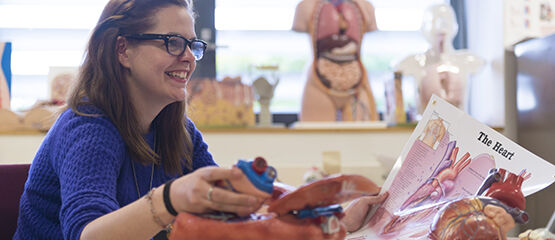For the past two years, we’ve been running workshops now known as KYO – Know Your Organs. They’ve proven popular with students here, have been taken out to schools and colleges and the initiative was even a finalist at the Student Nursing Times Awards. We spoke to final-year Nursing student, Debs Brennan, and one of the co-brains behind the KYO workshops, Dr Andy Powell, to find out what they are, why they’re so popular and how they could be helping you in the future!
How did Know Your Organs come about?
Andy: “Like all great ideas, ‘Know Your organs’ was conceived over a cup of coffee; a chance meeting between myself and a nursing colleague, Scott Colton, started a discussion about how we could better facilitate our student nurses’ understanding of anatomy and physiology. Little did we know how popular the initiative would become!”
What’s involved in the KYO workshop?
Andy: “The workshop we developed comprises 14 stations where students are presented with the opportunity to handle porcine organs (chosen because they’re similar in size and appearance to human organs) and take part in interactive activities such as inflating lungs and seeing the often catastrophic impact of ingesting a ‘button’ battery. The workshops are delivered in small groups of about 10 students so they provide an excellent opportunity for students to interact with staff and mentors and to ask those burning questions they may have relating to anatomy and physiology.”
Why is physiology and anatomy so important in health-related courses?
Andy: “I love physiology and am a passionate advocate for its inclusion in health-related courses, especially nursing, but I think it’s fabulous that the KYO workshop has been embraced by staff and students alike. Students often comment that the way we run the workshop really facilitates their learning and challenges their understanding of the way that physiology fits into their practice. It’s especially rewarding for me to hear that students have directly used the workshop to provide enhanced patient care.

One student reflected:
“Only recently I was able to explain to a very worried patient and their family about the terms ‘aneurysm’ and ‘sub arachnoid haemorrhage’ and how they sometimes occur. Patients value feeling listened to, they value being told in terms they understand, and they value our honesty – I couldn’t do my job nearly as well without understanding the science behind it all first.”
Two years later, we have now delivered the ‘Know your Organs’ workshop to nearly 500 student nurses and other health-related students such as physiotherapists. We have recruited some fabulous student mentors to help drive the project forward.”
Is a career in nursing for you?
We offer a range of undergraduate courses that could allow you to specialise in one or two fields of Nursing.
How does KYO help students?
Debs: “I began my university career knowing very little about physiology. The thought of it honestly petrified me as I’ve never seen myself as scientifically minded. At the end of my first lecture I felt so out of my depth I even questioned my decision to even embark on my nursing degree. But then ‘Know Your Organs’ came along and everything changed. From attending the very first workshop to now helping lead the mentorship team, my journey with Know Your Organs over the past two years has been nothing short of a revelation.
“The workshop compliments the nursing curriculum brilliantly, affirming knowledge, providing perspective and – in a lot of cases – teaching attendees something new. The workshop environment is relaxed and encourages you to ask questions, which you might not necessarily feel comfortable doing in the lecture environment. The presence of student mentors since the winter of 2017 has served a similar purpose, as students are sometimes more willing to open up about their difficulty understanding physiological processes to their peers.
“Being a student mentor has empowered me and encouraged me. I no longer feel daunted by learning something new but relish the challenge of understanding it and applying it to my practice. I am increasingly willing to step out of my comfort zone, knowing the greatest learning opportunities come when I step into something new.
“As I prepare for transition into newly qualified practise, I’ll be leaving BCU incredibly thankful for the seemingly endless opportunities that KYO has provided me. I will continue to advocate for this wonderful educational opportunity and I thoroughly recommended you attend a workshop!”






